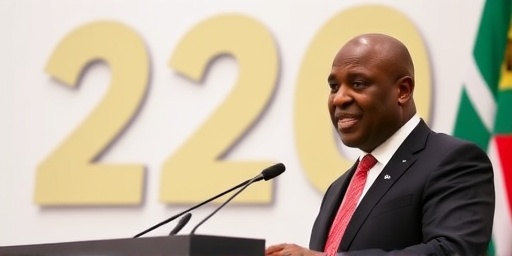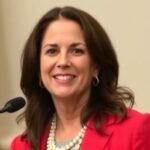In a powerful opening address at the G20 Leaders Summit in Johannesburg, South African President Cyril Ramaphosa called for immediate global action to address the mounting debt crisis in low-income countries, emphasizing the need for inclusive growth and sweeping financial reforms to stabilize the global economy. As world leaders gathered under the shadow of ongoing geopolitical tensions and inflationary pressures, Ramaphosa’s remarks set the tone for discussions aimed at reshaping international financial institutions like the IMF and World Bank.
- Ramaphosa Spotlights Debt Sustainability Crisis in Low-Income Nations
- Inclusive Growth Agenda Targets Widening Inequality Divides
- Financial Reform Proposals Aim to Modernize Global Institutions
- Global Economy Leaders Unite on Shared Challenges
- Prospects for G20 Breakthroughs Shape Future Economic Landscape
Ramaphosa Spotlights Debt Sustainability Crisis in Low-Income Nations
President Ramaphosa wasted no time in highlighting the dire state of debt sustainability for developing economies, a pressing issue that has intensified since the COVID-19 pandemic. According to recent World Bank data, over 60 low-income countries are now at high risk of debt distress, with public debt levels averaging 65% of GDP in sub-Saharan Africa alone. Ramaphosa pointed to nations like Zambia and Ghana, which have defaulted on sovereign debt in recent years, as stark examples of how unsustainable borrowing traps entire populations in cycles of poverty.
“The global economy cannot thrive when a third of the world’s countries are shackled by unpayable debts,” Ramaphosa declared during his speech, drawing applause from delegates. He advocated for innovative solutions, including extended debt moratoriums and concessional lending tied to green investments. This focus on debt sustainability aligns with the G20‘s Common Framework for Debt Treatments, established in 2020, but critics argue it has fallen short, restructuring only a fraction of the $1 trillion in debt owed by the world’s poorest nations.
Experts from the International Monetary Fund (IMF) echoed these concerns in pre-summit briefings. IMF Managing Director Kristalina Georgieva noted that rising interest rates in advanced economies have exacerbated the problem, with debt servicing costs for low-income countries surging by 30% since 2021. Ramaphosa’s push comes at a critical juncture, as the G20, representing 85% of global GDP, holds the leverage to mobilize creditor nations like China and Japan, which hold significant portions of emerging market debt.
Inclusive Growth Agenda Targets Widening Inequality Divides
Shifting from immediate debt relief to long-term strategies, the summit’s agenda placed inclusive growth at its core, aiming to ensure that economic recovery benefits all segments of society, not just the elite. Ramaphosa stressed the importance of policies that empower women, youth, and marginalized communities, citing statistics from the United Nations that show inequality has risen in 70% of countries since the pandemic began. In South Africa, where unemployment hovers at 33%, inclusive growth is not just an economic imperative but a social one, he argued.
The G20’s working groups have proposed initiatives like digital inclusion programs and skills training for the green economy transition. For instance, a new fund under discussion could allocate $100 billion over five years to support small businesses in Africa and Asia, fostering job creation in renewable energy sectors. Ramaphosa quoted a recent Oxfam report: “The world’s billionaires gained $3.3 trillion during the pandemic while 99% of the population struggled,” underscoring the urgency of redistributive measures.
International reactions were positive, with European Commission President Ursula von der Leyen pledging Europe’s commitment to inclusive growth through enhanced trade partnerships. “We must build an economy where growth lifts everyone, not leaves billions behind,” she said in a statement. This emphasis on inclusivity also ties into broader G20 efforts on gender equality, with goals to close the gender pay gap by 25% by 2030 through targeted investments in education and healthcare.
Financial Reform Proposals Aim to Modernize Global Institutions
A cornerstone of Ramaphosa’s vision is the reform of international financial institutions, which he described as outdated relics of the post-World War II era that fail to reflect today’s multipolar world. The IMF and World Bank, dominated by Western voting shares, have long been criticized for imposing austerity measures that hinder development in borrowing countries. Ramaphosa called for a reallocation of Special Drawing Rights (SDRs), the IMF’s reserve asset, to provide low-income nations with more liquidity without strings attached.
Under the current system, emerging economies hold only 40% of voting power despite comprising over 50% of global population. Financial reform advocates, including economists from the Bretton Woods Project, estimate that equitable governance could unlock an additional $500 billion in annual financing for climate and development projects. Ramaphosa proposed concrete steps, such as increasing the IMF’s quota shares for African and Asian members and establishing a global debt registry to enhance transparency.
U.S. Treasury Secretary Janet Yellen, attending virtually, expressed support for incremental reforms but cautioned against radical overhauls that could destabilize markets. “Financial reform must be pragmatic, ensuring the institutions remain effective guardians of the global economy,” she remarked. Meanwhile, Brazilian President Luiz Inácio Lula da Silva, host of the next G20 summit, aligned with Ramaphosa, advocating for a “new Bretton Woods” to address 21st-century challenges like climate change and digital divides.
Global Economy Leaders Unite on Shared Challenges
As the summit unfolded, leaders from the G20’s diverse bloc—spanning G7 powerhouses to BRICS emerging markets—converged on the intertwined threats to the global economy. Inflation remains stubborn at 6.5% worldwide, per IMF projections, while supply chain disruptions from the Russia-Ukraine conflict and U.S.-China trade frictions add layers of uncertainty. Ramaphosa urged a unified front, warning that fragmented responses could lead to a “lost decade” for growth in vulnerable regions.
Discussions delved into specifics, with a panel on trade resilience featuring input from Indian Prime Minister Narendra Modi, who highlighted how protectionist policies in the West undermine inclusive growth. Statistics from the World Trade Organization show that global trade volumes dipped 5% in 2022, disproportionately affecting export-dependent economies in Latin America and Africa. The G20 finance ministers, in a preparatory meeting, agreed on bolstering multilateral trade rules to prevent further fragmentation.
Environmental considerations wove through the talks, with debt sustainability linked to climate-vulnerable nations. The African Development Bank reported that climate shocks could wipe out 15% of GDP in some Sahel countries by 2050 without intervention. Leaders committed to integrating green clauses into debt agreements, allowing repayments to be paused during natural disasters—a novel approach to financial reform that could set precedents for future crises.
Side events amplified voices from civil society, where activists from debt justice networks like Jubilee Debt Campaign pressed for bolder action. “The G20 must move beyond rhetoric to real relief,” said campaign director Sarah Laserre, pointing to the $800 billion in annual fossil fuel subsidies that could be redirected toward sustainable development.
Prospects for G20 Breakthroughs Shape Future Economic Landscape
Looking forward, the Johannesburg summit holds promise for tangible outcomes that could redefine the global economy’s trajectory. Negotiators are close to finalizing a debt sustainability toolkit, including AI-driven risk assessments to predict crises early, potentially averting defaults in 20 high-risk countries. On inclusive growth, a landmark declaration may endorse universal basic services, ensuring access to healthcare and education as public goods, with pilot programs in Indonesia and Nigeria.
Financial reform talks could yield governance tweaks at the IMF’s 2024 review, increasing representation for the Global South and unlocking $650 billion in new SDRs. Analysts from Goldman Sachs predict these steps could add 1.2% to annual global growth by 2025, particularly benefiting Africa where GDP expansion lags at 3.8%. However, challenges persist: geopolitical rifts, such as U.S. sanctions on Russia, complicate consensus, and domestic politics in key nations may dilute commitments.
Ramaphosa closed the opening session optimistically: “This G20 is a turning point—a chance to forge a fairer, more resilient world.” As deliberations continue over the next two days, the summit’s success will hinge on bridging divides between creditor and debtor nations. If achieved, these advancements in debt sustainability, inclusive growth, and financial reform could pave the way for a more equitable global economy, mitigating risks from future shocks like pandemics or recessions. Stakeholders worldwide watch closely, hopeful for policies that translate into real-world progress for billions.
The summit also spotlighted youth involvement, with a G20 Youth Forum recommending blockchain-based transparent aid distribution to enhance financial reform efforts. In parallel, business leaders from the B20 group pledged $200 billion in private investments for inclusive growth projects, focusing on sustainable agriculture in Asia and infrastructure in the Middle East.
Broader implications extend to migration and security, as economic instability fuels unrest. The UN estimates 281 million international migrants, many driven by job scarcity in debt-burdened countries. By prioritizing inclusive growth, the G20 could reduce these pressures, fostering stability. Economists like Nobel laureate Joseph Stiglitz have praised the agenda, noting in a recent op-ed that “true financial reform requires democratizing finance, not just tweaking it.”
Environmental finance emerged as a wildcard, with proposals to swap debt for nature conservation, inspired by successful models in Belize and Gabon. This could free up $50 billion annually for biodiversity protection, aligning debt sustainability with planetary health. As the global economy grapples with 7.2% youth unemployment in developing regions, per ILO data, the G20’s focus on skills and innovation offers a pathway to harness demographic dividends.
In essence, the Johannesburg gathering transcends traditional summits, positioning the G20 as a catalyst for systemic change. Whether it delivers on Ramaphosa’s vision will determine if the global economy emerges more inclusive and resilient, or if old inequalities persist into the next decade.








